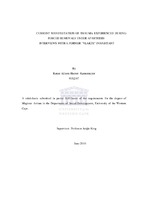| dc.description.abstract | Much has been researched in South Africa about the trauma of losing one's home, one's community and rebuilding one's life in a new environment. Several books have been published tracking the lives of the forcibly removed and their responses to leaving District Six. My research focuses on a different group namely those who had been forcibly removed from the centre of Stellenbosch, called Die Vlakte during that time. Living and working with and among people who have experienced this removal, I was keen to research whether the impact of the trauma is currently manifesting in this specific community and if so, what the symptoms would be. This qualitative inquiry focuses on one particular individual, Mr. Hilton Biscombe. I selected him because he, who experienced the removal as a teenager, spent most of his later life determinedly collecting stories and documents relating to this incident. Mr. Biscombe is also the only person of whom I am aware who responded personally through compiling a book, making a DVD, writing poetry as well as an autobiography relating to this event. My inquiry into the ways trauma manifests in a narrative, will be based on two interviews: one conducted by a white man from the University of Stellenbosch thirty years after the event; and another interview, six years later, conducted by myself.Our understanding of trauma is usually associated with a death or injury or the possibility thereof, but it could also include the victims response to extreme fear, serious harm or threat to family members. According to van der Merwe and Vienings, people also become traumatized when witnessing harm, physical violence or death or the sudden loss or destruction of a victim's home (van der Merwe Vienings, 2001). So the issue of trauma is not in question, nor the fact that forced removals cause trauma. I am exploring testimony in the form of interviews for possible current manifestations of this trauma thirty-six years down the line. | en_US |

